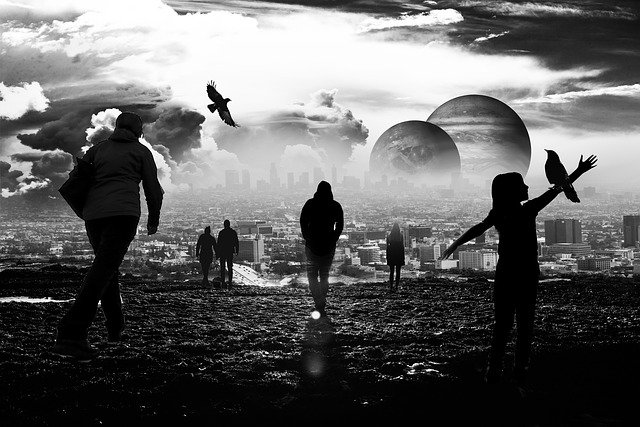 Submitted by Dr. Aadesh Kumar on
Submitted by Dr. Aadesh Kumar on

Image by 7436844 from http://Pixabay.com
We humans are an unruly bunch. So much so that we need laws to keep order, to make sure we stay on track. Without our laws, society would quickly descend into chaos. The laws of man are guarantors of order, a necessary control against the inherent greediness of our species. Nature, on the other hand, shows ordered patterns at all scales: trees branch, and so do rivers, bodies, and arteries; tides and planetary orbits are periodic, day follows night, the seasons alternate, the moon has phases. The display of order in Nature allowed for a methodic counting and organizing as a means to gain some level of control over what was otherwise distant and unapproachable, the marching patterns of a world moving in ways beyond human reach. - Marcelo Gleiser, https://www.npr.org/sections/13.7/2013/06/26/195534987/laws-of-man-and-laws-of-nature
In philosophy, the natural order is the moral source from which natural law seeks to derive its authority. Natural order encompasses the natural relations of beings to one another in the absence of law. which natural law attempts to reinforce. This is related to karma. The Law of Natural Order is an expression of the will of God or the Great Source.
In theory, there are two types of Natural Law. The first is a theory of morality that is roughly characterized by the following theses. First, moral propositions have what is sometimes called objective standing in the sense that such propositions are the bearers of objective truth-value; that is, moral propositions can be objectively true or false. Though moral objectivism is sometimes equated with moral realism (see, e.g., Moore 1992, 190: “the truth of any moral proposition lies in its correspondence with a mind- and convention-independent moral reality”), the relationship between the two theories is controversial.
The second thesis constituting the core of natural law moral theory is the claim that standards of morality are in some sense derived from, or entailed by, the nature of the world and the nature of human beings. St. Thomas Aquinas, for example, identifies the rational nature of human beings as that which defines moral law: “the rule and measure of human acts is the reason, which is the first principle of human acts” (Aquinas, ST I-II, Q.90, A.I). On this common view, since human beings are by nature rational beings, it is morally appropriate that they should behave in a way that conforms to their rational nature. Thus, Aquinas derives the moral law from the nature of human beings (thus, “natural law”).
But there is another kind of natural law theory having to do with the relationship of morality to law. According to natural law theory of law, there is no clean division between the notion of law and the notion of morality. Though there are different versions of natural law theory, all subscribe to the thesis that there are at least some laws that depend for their “authority” not on some pre-existing human convention, but on the logical relationship in which they stand to moral standards. Otherwise put, some norms are authoritative in virtue of their moral content, even when there is no convention that makes moral merit a criterion of legal validity. The idea that the concepts of law and morality intersect in some way is called the Overlap Thesis.
As an empirical matter, many natural law moral theorists are also natural law legal theorists, but the two theories, strictly speaking, are logically independent. One can deny natural law theory of law but hold a natural law theory of morality. John Austin, the most influential of the early legal positivists, for example, denied the Overlap Thesis but held something that resembles a natural law ethical theory.
The natural law is comprised of those precepts of the eternal law that govern the behavior of beings possessing reason and free will. The first precept of the natural law, according to Aquinas, is the somewhat vacuous imperative to do good and avoid evil. Here it is worth noting that Aquinas holds a natural law theory of morality: what is good and evil, according to Aquinas, is derived from the rational nature of human beings. Good and evil are thus both objective and universal. - https://iep.utm.edu/natlaw/#H1
The Divine Order of the UIniverse states: We live in an orderly universe, not an accidental one. Its movements are measured, its events are plotted, and its creatures develop towards a well-defined objective. All this could not be possible unless the universe were ruled by immutable laws. There is an invisible mechanism within the universe and an intelligent mind directing this mechanism. The cosmic order behind things is a divine one or it would be supplanted by nothing less than chaos. It is creative, intelligent, conscious--it is MIND. The universe could not exist as such if there were not some sort of equilibrium holding it together, some sort of balancing arrangement as in the spinning of the earth on its axis and the planets around the sun. A little thought will show the same principle in the just relation of human beings to the World-Mind and among themselves. Here it appears as karma. Those sceptics who assert that the universe is meaningless are themselves making a meaningful statement about it. That is, they are unconsciously setting themselves up as being more knowledgeable about whatever intelligence lies behind the designs and patterns we see everywhere in nature.There is enough evidence in Nature and in humanity for the existence of a Higher Power. Those who say they cannot find it have looked through the coloured spectacles of preconceived notions or else in too limited an area. There is plenty of it for those who look aright, and who widen their horizon; it will then be conclusive. There are orderly patterns in Nature which we can call "laws" in its timings, properties, measurements, and lives. The cosmos exists in a great harmony for it obeys laws which are divinely perfect. - https://paulbrunton.org/notebooks/26/1
Karma is a natural law and is part of the Universal Order ... Karma is the law of cause and effect by which each individual creates his own destiny by his thoughts, words, and deeds. According to the theory of karma, you have many karmas... personal karmas, cultural karmas, and karmas that involve the entire human race.
Posted for educational/informational puroses only.
- 594 reads